In its first record over 300 years ago, cordyceps have been used in traditional Chinese medicine as a remedy for multiple ailments.
Reports reference The Pharmacopoeia of the People’s Republic of China (2005) stating that cordyceps had been “used for the treatment of fatigue, cough, hyposexuality, asthenia after severe illness, renal dysfunction, and renal failure.”
About 750 cordyceps-related species have been identified.
The genus of fungus grows on the larva of insects. It’s always fascinating to think about the development of the medicinal use of mushrooms. Somewhere along the way, an individual had to see cordyceps growing on the larva of various insects and decided to consume it…gross!...but we’re glad they did!
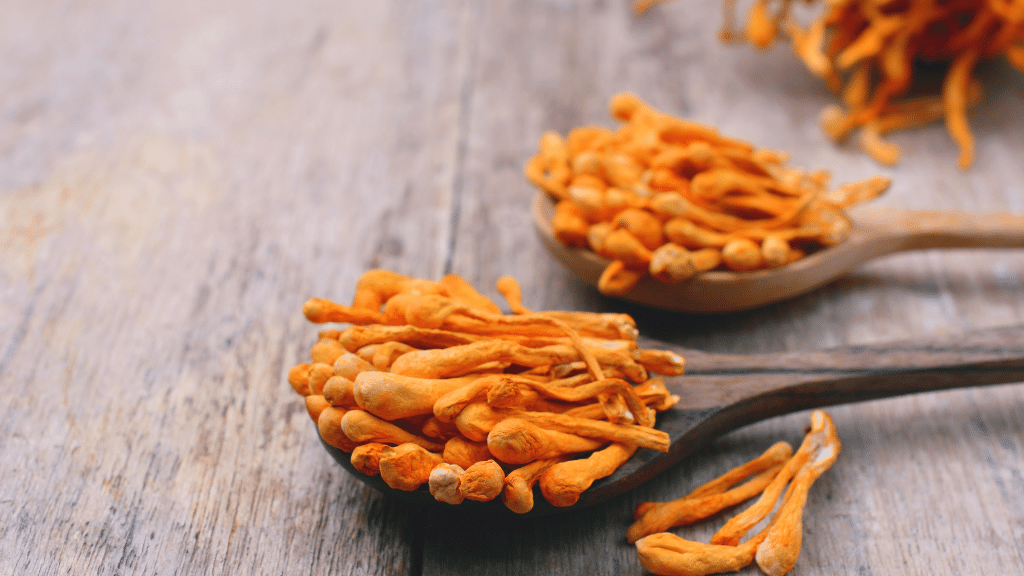
In this article, we’ll review the types of cordyceps mushrooms, the potential health benefits, some of the top studies for cordyceps, as well as dosage information and possible side effects.
Let’s dive in!
What are the types of cordyceps?
While hundreds of species have been identified, cordyceps sinensis (also referred to as caterpillar fungus) is the only one that is listed as an herbal drug in the Chinese Pharmacopeia.
However, cordyceps sinensis is extremely rare. It’s found in the mountains (high altitude regions) of Tibet, Nepal, India, and Bhutan. It’s one of the most famous species in traditional Chinese medicine, not only for its purported benefits, but because of the price it demands. Because of its rarity and decreasing yield, in 2007, a kilo of it was priced at $25,000 USD!
Clearly, this isn’t a feasible option to sell commercially, which is why the consumer products you’ll see available will often be listed as cordyceps militaris, a natural substitute that can be successfully grown on a larger, commercial scale. You can read the full article about the difference between them here.
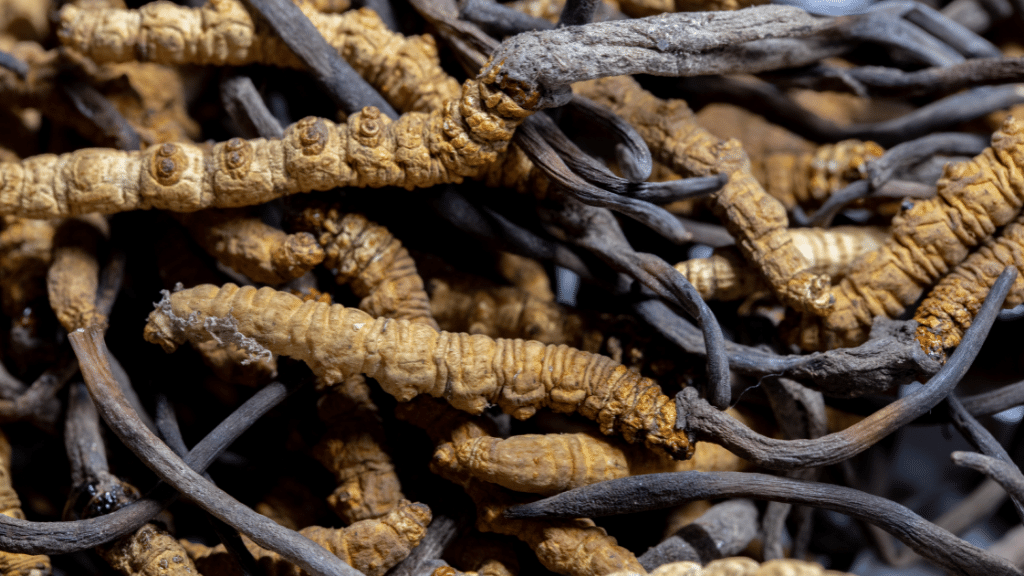
Cordyceps Health Benefits
As noted, cordyceps (sinensis and militaris) have been studied for many potential health benefits, including enhanced physical performance, improved energy, blood pressure, fatigue, anti-aging and anti-tumor properties. And benefits listed in the Chinese Pharmacopeia.
Below, we discuss 9 health benefits that cordyceps may support.
1. Enhanced physical performance and energy
One of the most widely purported benefits of cordyceps is its ability to boost athletic performance and energy.
While this dates back centuries in traditional Chinese medicine, it hit mainstream news back in 1993, when a group of Chinese olympic runners broke numerous records and credited their success to supplementing with cordyceps. However, it was later revealed that doping was linked to their success, but this shouldn’t fully discredit the benefits of cordyceps, as numerous studies have been done to further discover its potential. If anything, it may have just helped speed up the process of discovery.
- Human study: 20 healthy older adults, (50-75 years of age) were given 999mg (about 1g) of CS-4, a synthetic form of cordyceps sinensis for 12 weeks. It revealed that improves exercise performance and could aid in better overall health.
- Human study: 37 healthy older adults, were given 3g of CS-4 per day over 6 weeks, VO2 max increased significantly, and supported the belief “that Cs-4 could improve oxygen uptake or aerobic capacity.”
- Human study: 22 male cyclists were given 3g of CS-4 daily for 5 weeks. This study reported that there was “no effect on aerobic capacity or endurance exercise performance in endurance-trained male cyclists.”
- Human study: 28 young adults, (18-35 years of age) were given a blend of cordyceps militaris and the results reported that it may improve tolerance to high intensity exercise.
What we see here is the need for continued research. Exercise performance in cordyceps studies have been linked to increased VO2 max which essentially is the amount of oxygen your body uses while exerting as much effort as possible. The more oxygen you can get into your lungs, the better, and is often considered to aid in physical performance. While one study reported that VO2 max increased by 7% in 30 healthy older adults, and another study on 28 young adults reported an increase in Vo2 max by 11%, one study reported no change.
With limited studies done, the overall consensus seems to be that more research is needed on the duration of the study as well as the dosage, with this report stating, “greater benefits may be elicited with longer supplementation, with potential improvements in oxygen consumption, ventilatory threshold, time to exhaustion, and relative peak power output at a dosage of 4 g·d−1. Future studies should aim to establish dosage for maximal ergogenic benefits.”
The groundwork has been laid for more research into the potential benefits cordyceps has on physical performance, but with not enough substantial evidence to support the how, why and what factors ultimately influence the outcome of the study.
Even with the few studies available, cordyceps popularity has grown rapidly for this potential benefit. The thought that this natural remedy could improve physical performance and energy is the primary reason why many consumers have started supplementing with cordyceps, often adding it to their coffee or before workouts.
For more on getting the most out of your cordyceps supplement, check out this article.
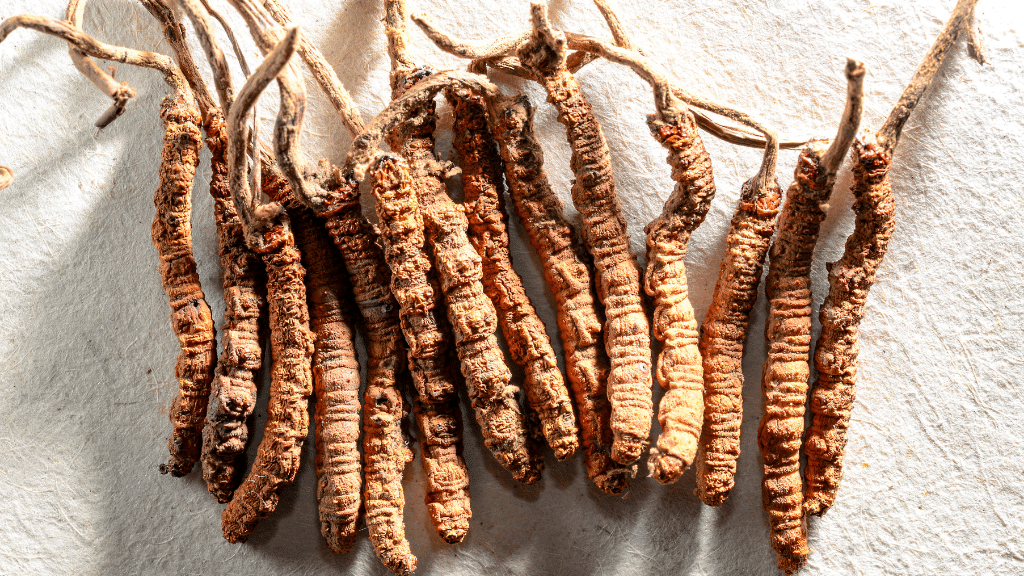
2. Fights fatigue
We all want that post-coffee feeling. But what if there was a way to get some of that feeling without the actual coffee? According to one study done on mice, cordyceps could be used to help fight fatigue.
- Animal study: A swimming test on mice revealed that Cordyceps militaris induces fatigue recovery. It also stated that, “Our data provides experimental evidence in supporting clinical use of Cordyceps militaris as an effective agent against fatigue.”
3. Helps treat high blood pressure
Many mushrooms, including reishi and turkey tail have been evaluated for their potential benefits for those with high blood pressure. Cordyceps show similar potential benefits.
- Animal study: A study on rats, utilizing polysaccharides from cordyceps sinensis was done in order to evaluate its use to treat high blood pressure. The “results suggested that CSP1 may possess high potential in treating hypertension.”
- In Vivo Study: A study was done on the effects of yarsagumba (cordyceps sinensis) on pulmonary hypertension, which is a type of high blood pressure that affects arteries in the lungs and the right side of the heart. The study demonstrated that, “usage of Yarsagumba extract may be a promising therapeutic strategy for the treatment of severe and incurable disease, such as PH, due to its promising anti-proliferative and vasodilatory characteristics.” However, as with many studies regarding cordyceps, there is not conclusive evidence and it suggests that in vivo studies are crucial to further understand and investigate the potential effects.
3. Anti-aging characteristics
Much of the link for cordyceps to potentially provide “anti-aging” benefits are its antioxidant properties. Antioxidants are substances that can prevent or slow down the damage to cells caused by free radicals.
- Animal Study: A study done on mice to provide insight into the anti-aging effect of cordyceps sinensis extract (CSE) suggested that, “CSE has an anti-aging effect.”
- Animal Study: Another study done on mice, but with cordyceps militaris, was performed with the basis to determine the effects on mitochondrial injury and anti-aging activity from the polysaccharides (cordyceps militaris polysaccharides) from the fruiting body. The study stated, “CMP may have pharmaceutical values for mitochondrial protection and anti-aging.”
- Animal study: A study on mice that was designed to understand the potential antioxidant and anti-aging effects of cordyceps taii. Specifically, the “polysaccharides possessed potent antioxidant activity closely associated with immune function enhancement and free radical scavenging. These findings suggest that the polysaccharides are a promising source of natural antioxidants and anti-aging drugs.”
- Animal Study: A study on mice was done with CS-4, a synthetic form of cordyceps sinensis, that we touched on for human trials on athletic performance. This study, was developed to identify the potential for anti-aging in mice. Mice were given CS-4 or a control (placebo). “All control mice died before 3 yrs of age while Cs-4 extended lifespan by 10–66 days at 50% survival and 45–153 days at 10% survival. The age of the oldest surviving mice was extended 152 days.” This supports the belief that CS-4 provides anti-aging benefits to humans, though further studies need to be conducted.
- Insect Study: An interesting study on fruit flies was done to understand its antioxidant properties. Fruit flies were exposed to acute oxidative stress and an oral liquid of cordyceps sinensis was given to verify the effect. The study stated that, “data demonstrated that CSOL prolonged the lifespan of fruit flies through an anti-oxidative stress pathway.” But, in parallel to the other studies, it was important that the study noted that anti-aging properties would need to be confirmed through future studies.
While there have been multiple animal studies on the potential anti-aging benefits of cordyceps, more research is needed, especially in the form of human trials.
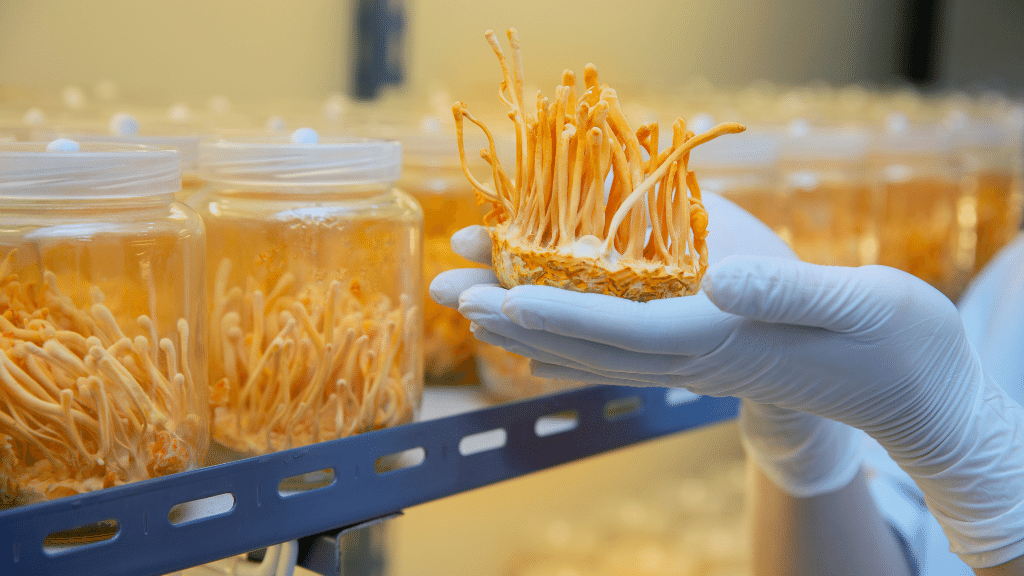
4. Improves sexual drive and function
Cordyceps have a long history (centuries, in fact!) of being used for improved libido and sex drive.
- Animal Study: A study done over 6 weeks with supplementation of cordyceps militaris mycelium on 7-week old rats to determine effect on sperm production, motility, and hormones. The study reported that the “results indicate that supplementation with CM improves sperm quality and quantity in rats.”
- In Vivo Study: In women, “17-beta Estradiol (estradiol) is a steroid hormone produced primarily by the ovaries during the reproductive lifespan and is responsible for the development of female secondary sexual characteristics and maintenance of the female reproductive tract.” - ScienceDirect A study was done to investigate the effects on 17-beta Estadiol (E2) with cordyceps sinensis mycelium on human granulosa-lutein cells (GLC). The study reported, “We found that CS induced E2 production by GLC” and that the “data may help in the development of treatment regimens to improve the success rate of in vitro fertilization.”
- Animal Study: A study on mice to evaluate the anti-aging effects of cordyceps sinensis extract also reported that it could “promote sexual function in castrated rats.”
- Animal Study: A study on rats with cordycepin, a derivative of adenosine, which is a nucleoside that occurs naturally in the cells of the human body. There are many interests in the power of cordycepin, which is an active constituent of cordyceps militaris. The study was meant to evaluate the effects of cordycepin (COR) on senile testicular dysfunction in rats. The report stated, “the results suggest that COR holds immense nutritional potential and therapeutic value in ameliorating age-related male sexual dysfunctions.”
We talk more about mushrooms and libido here.
5. Slow tumor growth
Much of the studies done on cordyceps on its potential health benefits have been conducted in vitro (test tube) or on animals (typically mice). The need for human studies is imperative to understand the full potential. The same holds true for the ability for cordyceps to potentially slow tumor growth and deliver anti-tumor properties.
- In Vitro Study: A methanolic (alcohol) fruiting body extract of cordyceps militaris was shown to reduce the growth of non-small cell lung cancer cell line. The work done here stated that it “supports the potential of this extract as a source of bioactive compounds, which may be used in anticancer strategies.”
- In Vitro Study: An ethanol (alcohol) extract of cordyceps militaris was researched to study its effects on the human colorectal cancer-derived cell line (rectum/colon). It stated that “it was highly cytotoxic to human colorectal carcinoma RKO cells and inhibited the growth of tumor in xenograft model.”
- In Vitro Study: A cordyceps militaris extract was evaluated for its effects on human malignant melanoma cells (skin cancer). The study reported, “We demonstrated that Cordyceps militaris extract remarkably suppressed tumor growth via induction of apoptotic cell death in culture that links to the abrogation of VEGF production in melanoma cells.”
- In Vitro Study: Gold nanoparticles with cordyceps militaris were studied for their effects on Hepatocellular carcinoma (liver cancer), stating “Our results concluded that the gold nanoparticles with C. Militaris would be an efficient chemotherapeutic drug against the hepatocellular carcinoma cells.”
- Animal Study: A study on mice with cordyceps sinensis extract on its effects lymphoma cells stated that, The tumor-bearing mice receiving this medicine lived significantly longer than any other groups without CSE.
- Animal Study: An ethyl acetate (alcohol) extract and a hot water extract of cordyceps sinensis mycelium were studied for their potential inhibitory effects on “MCF-7 breast cancer, B16 mouse melanoma, HL-60 human premyelocytic leukemia and HepG2 human hepatocellular carcinoma” cell lines. The ethyl acetate extract showed the most significant effects. The hot water extract did not. The study further stated, “Our results suggest that the EtOAc extract of Cs fungal mycelium has strong anti-tumor activity and is a potential source of natural anti-tumor products.”
- Animal Study: A study on mice with a water extract of cordyceps sinensis was done to understand its effects on lung cancer and melanoma cells. The report concluded that the water extract “showed a strong cytotoxicity against LLC (lewis lung carcinoma) and B16 (melanoma) cells.”
6. Type 2 Diabetes support
There are a growing amount of animal studies on the use of cordyceps and its potential to aid in type 2 diabetes support, with the primary potential to reduce blood sugar/glucose levels.
- Animal Study: A study was done with the use of polysaccharides from cordyceps militaris to evaluate the hypoglycemic effect it has on diabetic mice. The study reported that, “Cordyceps polysaccharides can effectively reduce the blood glucose level of diabetic mice, thus regulating the metabolism of their energy, amino acids and intestinal microbes.”
- Animal Study: A study on diabetic rats evaluated the effects of cordyceps militaris fruiting body extract. It concluded that, ”Cordyceps militaris fruit body extract, a safe pharmaceutical agent, thus has great potential as a new treatment for diabetic patients, especially those with nephritis.”
- Animal Study: A study evaluated the effects of cordyceps militaris fruiting body and mycelia on high-fat diet-induced mice. It stated that it “could be a potential and economical therapeutic agent in the treatment of HFD-induced type 2 DM (diabetes mellitus) through hypoglycemic activity.”
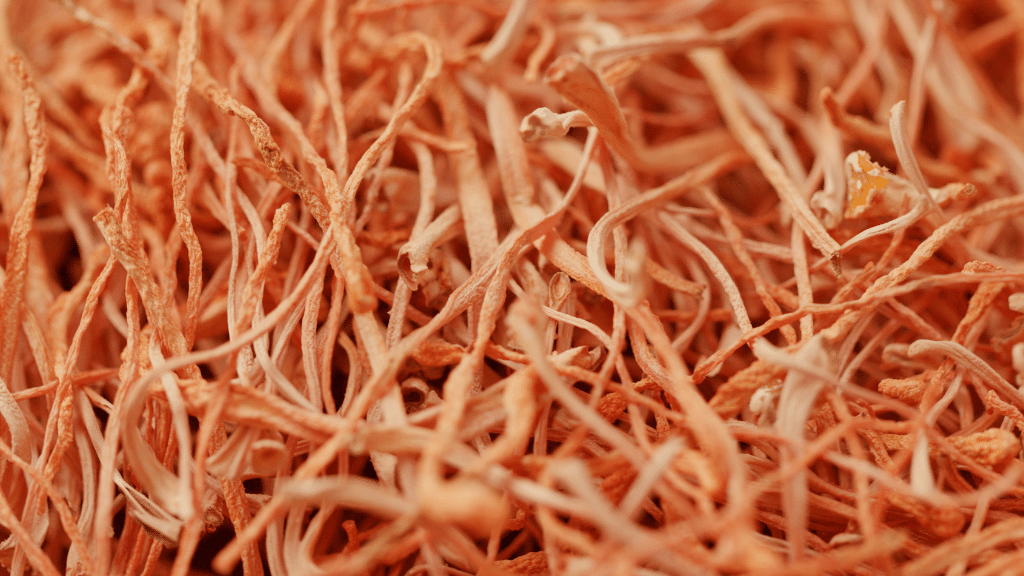
7. Kidney protecting properties
- Human Study: A study was conducted on 98 patient volunteers that suffered from chronic kidney disney. They were given 100mg of cordyceps militaris per day for 3 months. The study reported that, “Cordyceps militaris protected against CKD progression by affecting the TLR4/NF-κB lipid and redox signaling pathway via cordycepin.”
- Animal Study: A study on was done to evaluate the effects of cordyceps sinensis on its potential to protect against liver and and heart injuries in rats with chronic kidney disease. The study stated the results and the link to chronic kidney disease and oxidative stress, energy, amino acid, choline, and protein metabolism, stating, “Oral administration of Cordyceps sinensis exerted statistically significant rescue effects on the liver and heart by reversely regulating levels of those metabolites that are typically perturbed in CKD.”
Precedence has been set for further research on cordyceps sinensis and the potential role it can play in fighting chronic kidney disease. A report summarized a group of 22 different studies, and suggested that it “showed potential promise to decrease serum creatinine, increase creatine clearance, reduce proteinuria and alleviate CKD‐associated complications, such as increased haemoglobin and serum albumin.”
These findings, however, are not conducive, as many studies were not high quality. It was more of a summary of other studies that were done, and the level of control should be noted. However, it does suggest the need for further research and discovery into the potential for cordyceps and its role in kidney function.
8. May aid in heart health
Cordyceps mushrooms, among others, have the potential to improve your overall heart health. Check out this article for more details on how you can use mushrooms for your heart.
- Animal Study: This study on rats, also listed in the chronic kidney disease category, showed that “oral administration of cordyceps sinensis significantly attenuates the liver and heart injuries in CKD rats.” It’s ability to reduce the effects of those injuries on those organs may suggest its potential to aid in heart health.
- The other studies that have been done in regards to cordyceps and heart health can be linked to underlying issues that may pose greater risk for heart disease, including bad cholesterol (LDL) and triglycerides.
- Animal Study: A study was done on cordycepin from cordyceps militaris on hamsters and rats to evaluate its lipid-lowering effects. It stated that, “cordycepin reduced levels of serum TC (total cholesterol), TG (triglyceride), LDL-C…” but that more research was needed to determine exactly why this happens.
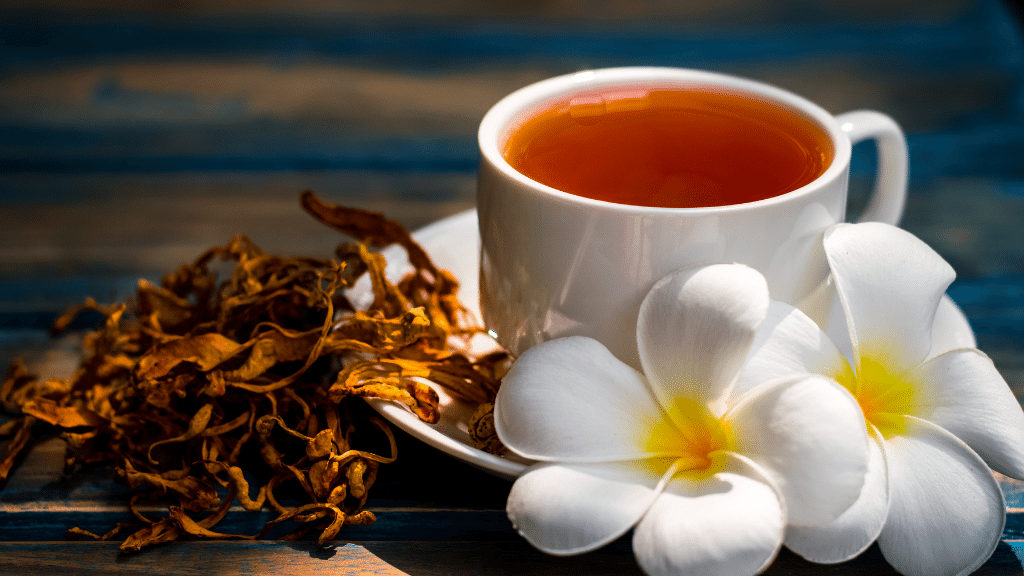
9. Anti-inflammatory
- In Vitro Study: A study was conducted on a strain of cordyceps mycelium, named CBG-CS-2. It reported that, “CBG-CS-2 has modulatory effects on the inflammatory system in macrophages, and that it can serve as a useful anti-inflammatory dietary supplement or drug.”
An important note on the studies listed above
It’s hard to doubt the potential health benefits of cordyceps, but as is the case with many mushrooms, while research exists, it most often falls under test tube or animal studies with little human studies having been conducted.
Nevertheless, it certainly provides the foundation for continued research, and these studies have paid the way for more significant discoveries in the future that we will be sure to update you on!
How much cordyceps should I take?
Cordyceps dosage depends on the form taken, as it does with all mushrooms.
If you’re consuming raw cordyceps militaris (mycelia or fruiting body), the typical dose is between 4 to 10 grams per day.
In regards to cordyceps extract, the dosage most commonly used in studies is between 1-3 grams or 1000 to 3000mg per day.
Understand that with many mushroom supplements, like cordyceps, official recommended dosage has not been evaluated, and largely comes down to individual factors, including, but not limited to age, weight, and the condition you are looking to help alleviate.
Be sure to speak with your doctor before incorporating any natural supplement into your diet. It’s always smart to start at a lower dose and find what works best for you.
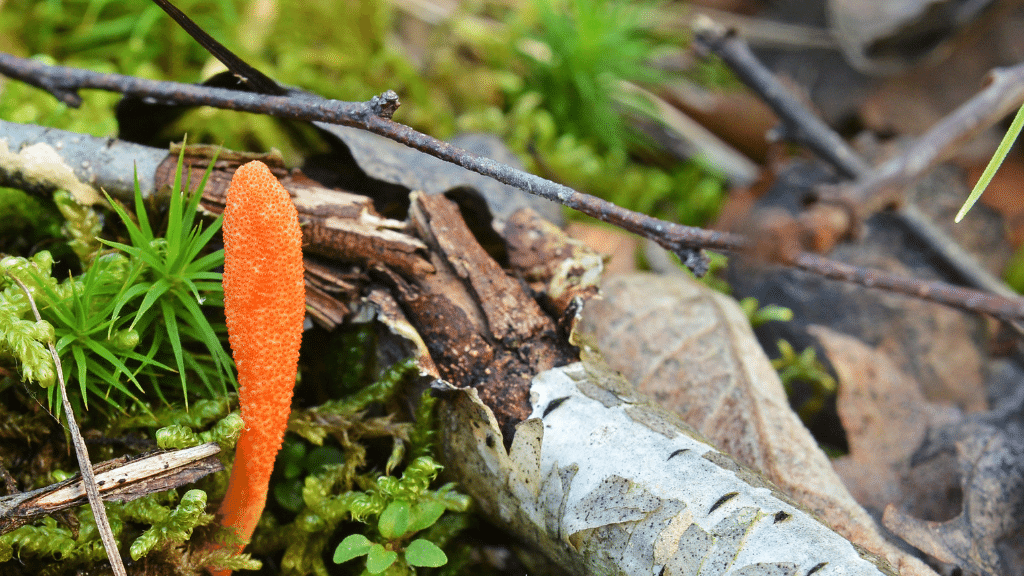
What are the side effects of cordyceps?
From studies conducted, cordyceps has been relatively considered to be non-toxic with no major side effects.
This study summarizes the pharmacological and therapeutic potential of cordyceps, stating that some reports have noticed possible adverse effects including
- Nausea
- Diarrhea
- Dry mouth
- Allergic reactions
Discontinued use resolved these adverse effects.
With any supplement, it’s important to understand your own body and seek medical guidance, and discuss your interest in taking cordyceps with your physician.
If you’re pregnant and/or breastfeeding, it’s best to consult a physician before use. Data surrounding this group is still limited.
It’s also important to note that due to the anti-viral and hypoglycemic properties of cordyceps, those taking anti-viral medications or are using diabetes medications/undergoing treatments should be cautious about supplementation as this could affect the dose of current medications/treatments.
Stated in the same report above, “Cordyceps dosage up to 80 g/kg body weight/day for 7 days was injected intraperitoneally in mice and even then it did not cause any fatality… In another study, rabbits fed through mouth for 3 months at a dose of 10 g/kg/day did not show any deviancy in blood reports, or in kidney, liver functioning.”
High doses were given to evaluate the toxicity of cordyceps in these studies and no extreme, adverse side effects were not noted.
For the full scoop on the known cordyceps side effects, read our blog.
What to look for in a cordyceps product
When it comes to buying cordyceps supplements, there are a few things you’ll want to be on the lookout for.
Remember at the very beginning of the article, we discussed cordyceps sinensis and cordyceps militaris.
Cordyceps sinensis is extremely rare, AND expensive. Its yield is decreasing rapidly from over-cultivation. It’s not feasible for a commercial product, so those that are advertising that they are selling authentic, cordyceps sinensis are misleading you. It’s not the wild fruiting body that research has supported, but instead, is likely to be mycelium grown on grain, which doesn’t have studies to support the claims companies are making.
Cordyceps militaris, on the other hand, has been shown to be a natural substitute and can be grown indoors on a nutritious substrate.
This is what you’ll likely see cordyceps consumer products promoting and is often going to be the best product for you.
If you're just getting started, we suggest trying cordyceps coffee. Find out how to make it at home with this step-by-step guide.
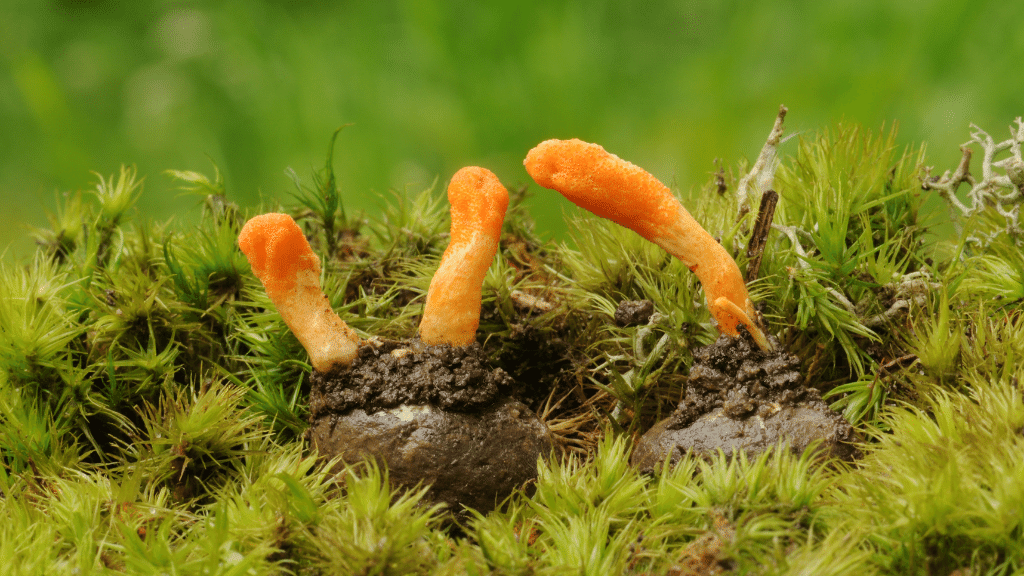
Cordyceps fruiting body vs mycelium
In regards to cordyceps fruiting body vs cordyceps mycelium, studies have been done on both. However, when it comes to mycelium, products grown in the wild may have a much different benefit than those grown commercially on grain/rice/oats.
If you’re looking for a cordyceps product, you should be looking for a combination of both (if the company you’re buying from can detail the cultivation practice) or a product that is strictly the fruiting body only.
This assures the mushroom has reached full maturity, and starch concentration will be lower (as opposed to products made from mycelium on grain). For more on the great fruiting body vs mycelium debate, check out this dedicated article.
What we do know from research is that polysaccharides are an important piece to the benefits of cordyceps, often being linked to the anti-viral, anti-oxidant, anti-tumor, and hypoglycemic properties of the fungus. That and cordycepin, which is also present in cordyceps militaris.
Cordyceps benefits from hot water and alcohol (dual extraction), so typically, it’s best to look for companies that do both.
However, the most important thing is that companies can provide lab tests that detail the amount of polysaccharides (beta-glucans) as well as cordycepin, which are two of the most studied bioactives of the fungus.
Assurance from companies on the safety tests and active compounds will help assure you’re getting a quality product. Industry leaders are quick to offer this information on their site or through inquiry.

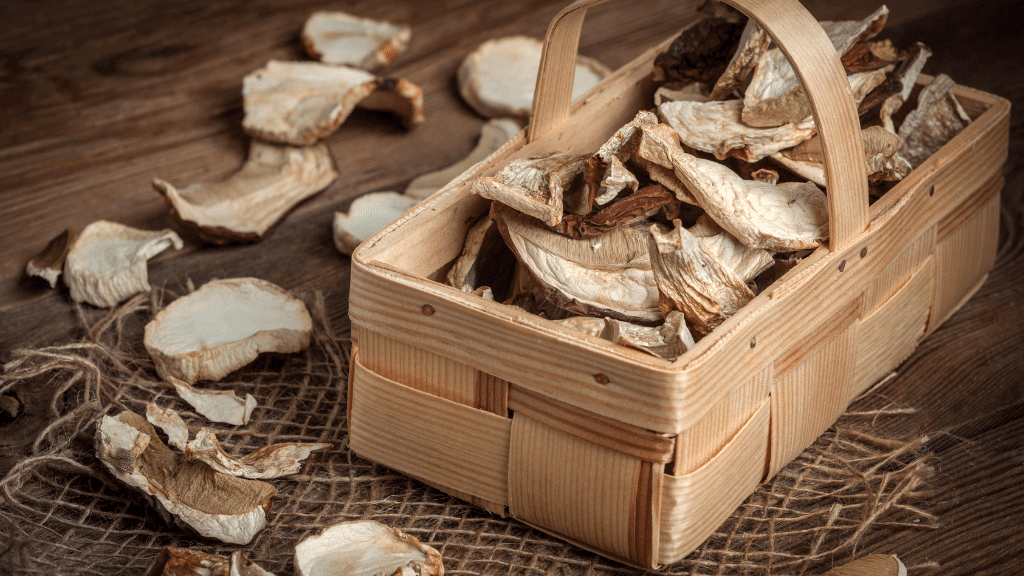
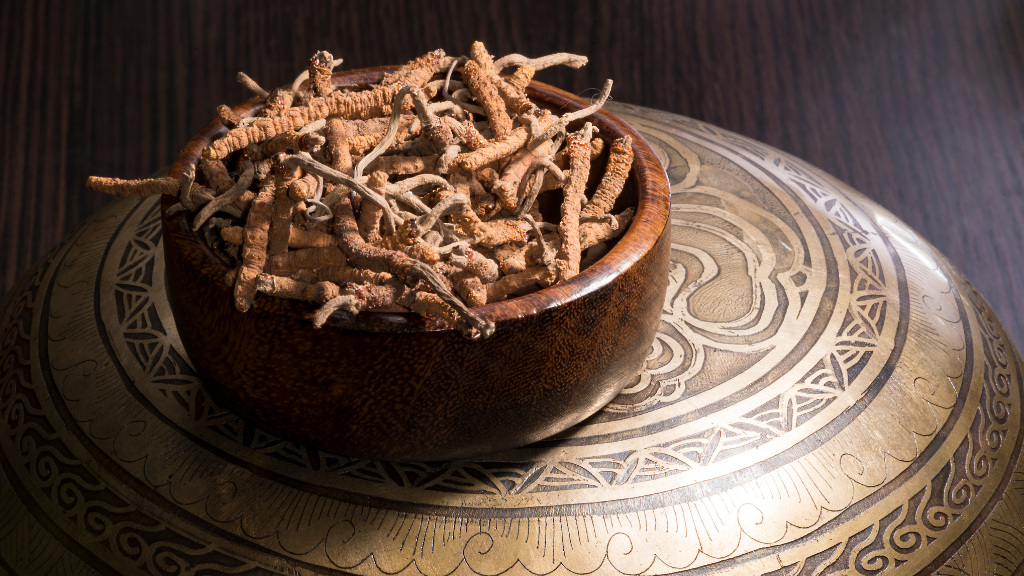


.png)
